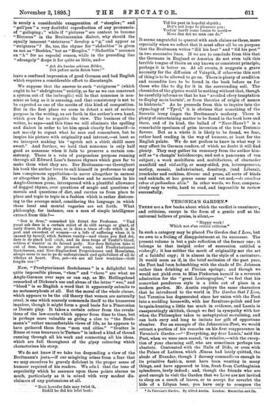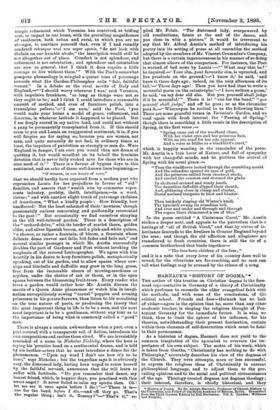VERONICA'S GARDEN.*
THERE are a few books about which the verdict is unanimou', and criticism, except in the form of a gentle puff at the universal bellows of praise, is silent,— "Happy work !
Which not e'en critics criticise."
In such a category may be placed The Garden that I Love, but we own to a feeling of disappointment at its successor. The present volume is but a pale reflection of the former one ; it belongs to that insipid, order of succession entitled a rechauffe; it has neither the merit of originality nor the art of a faithful copy; it is almost in the style of a caricature. It would seem as if, in the brief seclusion of the past year, the Poet had been hobnobbing with the shade of Dr. Johnson rather than drinking at Pierian springs ; and though we would not yield even to Miss Pinkerton herself in a reverent admiration for the " great Lexicographer," we feel that his somewhat ponderous style is a little out of place in a modern garden. Mr. Austin employs the same characters that he introduced to the world in The Garden that I Love, but Veronica has degenerated since her union with the Poet into a scolding housewife, with her furniture-polish and her bargain-hunting a little too much in evidence, and Lamia is exasperatingly skittish, though we feel in sympathy with her when the Philosopher takes to metaphysical moralising, and can both envy and long to imitate her gift of opportune slumber. For an example of the Johnsonian-Poet, we would extract a portion of his remarks on his first reappearance in
Veronica's Garden 'Everything, my dear Lamia,' said the Poet, when we were once seated, 'is relative,—with the excep- tion of your charming self, who are sometimes perhaps too absolute. Contrasted with the Halls of Dido, or even with the Palace of Latinus, which Eneas had lately quitted, the abode of Evander, though I daresay commodious enough in its primitive fashion, must have been wanting in many things, and have appeared to him, fresh from Carthaginian splendours, lowly indeed ; and, though the friends who are good enough to visit the Garden that we Love are not invited to sleep on a couch of leaves, or to accept for coverlet the hide of a Libyan bear, you have only to compare the
• In Veronica's Garden. By Alfred Austin. London: Macmillan and Co. simple refinement which Veronica has contrived, at trifling cost, to impart to our home, with the prevailing magnificence of residences, both urban and rural, to which you are no stranger, to convince yourself that, even if I had roundly rendered rebusgue veni non asper egenis, "do not look with disdain on our bumble abode," the inscription would still be not altogether out of place. Comfort is not splendour, and refinement is not ostentation ; and splendour and ostentation are now so general, that I think it does require a little courage to live without them." With the Poet's somewhat pompous phraseology is mingled a quaint tone of patronage towards what the Garden-Philosopher calls "fair, faithful -women." In a debate on the rival merits of Italy and England,—" 'I should worry wherever I was,' said Veronica, with impulsive frankness, so long as things were not as they ought to be; and I think I could introduce a reasonable amount of method, and even of furniture polish, into a transalpine palazzo.'—` I am sure,' said the Poet, you would make your house a model of grace, refinement, and decorum, in whatever latitude it happened to be placed. But I am deeply rooted in my native land, and could not without a pang be permanently transplanted from it. If this should seem to you and Lamia an exaggerated sentiment, it is, if you will forgive me for saying so, because you are women, not men, and quite naturally do not feel, in ordinary times at least, the impulses of patriotism as strongly as men do. Were England in danger, I am sure you would then not dream of quitting it, bat would manifest on its behalf the feminine devotion that is never fully evoked save for those who are in sore need of it'" There is a flavour of bygone days in this sentiment, and an echo of those well-known lines beginning,— "0 woman, in our hours of ease," that we should hardly have expected from a modern poet who reproaches Lamia for her prejudices in favour of " old " families, and asserts that " wealth won by commerce repre- sents industry, probity, thrift, intelligence,—in a word, virtue ; " and with another slight touch of patronage exclaims of Americans, " What a kindly people : How friendly, how unaffected! Not the least ashamed of their newness,' though passionately curious concerning and profoundly reverential to the past !" But occasionally we find ourselves straying in the old well-beloved garden. There is a description of the "orchard-drive," with its border of scarlet thorn, golden elder, and silver Spanish broom, and a pink-and-white quince, " a shower, or rather a fountain, of bloom, a fountain whose delicate dome carves and falls, but fades and fails not," and several similar passages in which Mr. Austin successfully doubles the part of Gardener and Poet without invoking the emphasis of the revered Lexicographer. We agree with him heartily in his desire to keep furniture-polish, metaphorically speaking, out of his garden, and to allow spaces where cow- slips and bluebells and daffodils may grow in the long grass, -free from the inexorable shears of mowing-machines or scythes, under the shelter of oak or thorn, or in the open spaces between the blossoming fruit-trees. Every reader who loves a garden would rather hear Mr. Austin discuss the merits of a Queen Anne pleasaunce or watch him in imagi- nation surreptitiously sowing "casual" poppies and evening primroses in his potato-furrows, than listen to his moralising on the true nature of poets, or producing the theory that the most important thing in life is to be a man, and the next most important is to be a gentleman, without any hint as to the importance of being what is commonly called a "good" man.
There is always a certain awkwardness when a poet, even a poet covered with a transparent veil of fiction, introduces his own compositions and recites them aloud. We are irresistibly reminded of a scene in Nicholas Nichleby, where the hero is trying his 'prentice hand on a sentimental drama, and is told by his brother-actors that he must introduce a dance for the phenomenon. "Upon my word I don't see how it's to be done," says Nicholas ; but the tragedian says it is obviously easy, the distressed lady, having been urged to rouse herself by the faithful servant, announces that she will learn to suffer with fortitude. " Do you remember that dance, my honest friend, which, in happier days, you practised with this sweet angel ? It never failed to calm my spirits then. Oh ! let me see it once again before I die !"—" There it is— cue for the band, before I die,—and off they go. That's the regular thing ; isn't it, Tommy ?"—" That's it," re-
plied Mr. Folair. "The distressed lady, overpowered by old recollections, faints at the end of the dance, and you close in with a picture." It would be irreverent to say that Mr. Alfred Austin's method of introducing his poetry into its setting of prose at all resembles the method adopted by the members of Mr. Vincent Crnmmles's Company, but there is a certain ingenuousness in his manner of so doing that almost allows of the comparison. For instance, the Poet is warned of bad news by Lamia :—" What may that be ? '
he inquired.—' Your elm, your favourite elm, is uprooted, and lies prostrate on the ground.'—' I know it,' he said, and
knew it three days ago ; indeed, on the very afternoon of its fall.'—' Three days ago! Then you have had time to write a mournful poem on the catastrophe.'—' I have written a poem,' he said, on my dear old elm. Bat you yourself shall judge if it be mournful.' " There it is! "cue for the band," "you yourself shall judge," and off he goes; or as the chronicler puts it,—" Whereupon he recited to us the following lines." There are some graceful verses in Veronica's Garden, and we read again with fresh interest the " Passing of Spring,"
though there is something a little comic in the description of Spring, in the first verse :-
" Spring came out of the woodland chase, With her violet eyes and her primrose face, With an iris scarf for her sole apparel, And a voice as blithe as a blackbird's carol,"
which is happily wanting in the remainder of the poem. Mr. Austin is a true lover of Nature, and full of sympathy with her changeful moods, and he pictures the arrival of Spring with his usual grace :—
" Then the windflower looked through the crumbling mould And the celandine opened its eyes of gold, And the primrose sallied from chestnut shade, And carried the common and stormed the glade.
In sheltered orchard and windy heath The dauntless daffodils slipped their sheath, And, glittering close in clump and cluster, Dared norland tempests to blow and bluster.
Then tenderly ringing old Winter's knell, The hyacinth swung its soundless bell, And over and under and through and through The copses there shimmered a sea of blue."
In the poem entitled "A Christmas Carol," Mr. Austin strikes a deeper note, and appeals to the patriotism that is a
heritage of "all of British blood," and that by virtue of in- heritance descends to the dwellers in Greater England beyond the seas; and though the old affection and allegiance are transferred to fresh countries, there is still the tie of a common brotherhood that binds together-
" The free-born children of the free ; "
and it is a note that every lover of his country does well to sound, for the vibrations are far-reaching, and no man can tell what feelings may be aroused by the echoes of a song.



















































 Previous page
Previous page